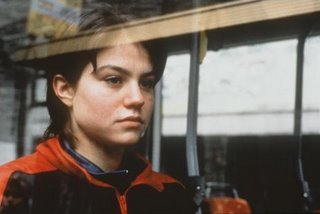Rosetta (1999)

Jean-Pierre and Luc Dardenne are the greatest directors of close-ups in the world. The close-up, so conventionally used as a crutch by lazy filmmakers, is elevated to a work of art in the Dardennes films; I could watch a Dardennes close-up for hours, which is fortunate because when you watch one of their movies, you essentially watch a Dardennes close-up for hours. The brothers don't have much use for any other sorts of shots.
I'm trying to invent a pithy term to describe their aesthetic. The best and most descriptive I've come up with is "anti-point of view." In a point of view shot, the camera assumes the perspective of the character and we see what they see (there is a very good, very lengthy one in The Black Dahlia, which I saw earlier this evening, for example). In Rosetta, we almost never see what the title character sees; in fact, we almost never see anything but Rosetta herself. Aside from the obvious intimacy such a shot creates, the Dardennes unblinking camera is so close to their subject that her face frequently fills the frame to the point of blocking out most of the details of the world around her. In several scenes, they build suspense of the simplest and most natural kind simply by having us observe Rosetta react to something off-screen but refusing to cut away or pull back to let us see what she's observing. If the cinema makes us all into voyeurs, the Dardennes fluster audiences by refusing to indulge that most primal of urges.
This is only the second film I've seen by the Dardennes. The first, L'Enfant remains my favorite film released theatrically in 2006. Rosetta is, I think, a slightly weaker film, but I must say that the final, wordless shot, which consists of a simple, wordless gesture, moved me more than anything in the last dozen films I'd seen before it.

0 Comments:
Post a Comment
<< Home